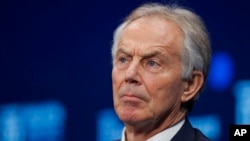Former British Prime Minister Tony Blair warned Thursday that the current global approach in the fight against Islamist terrorism adopted since the 9/11 attacks has failed. A more complex strategy is needed, he said.
"The essence of my message today is to say that when you look at the scale and the scope of this problem, without combating the ideology and the ideas, you will never defeat the extremism," Blair said during a speech at the Council on Foreign Relations in Washington, where he introduced the findings of a report by his Institute for Global Change.
"Security measures obviously have in many ways been effective and must remain in place. But the reality is security alone will only slow the violence," Blair said.
The report, Global Extremism Monitor: Violent Extremism in 2017, found that despite counterterrorism efforts to defeat Islamist extremists militarily, the challenge has proliferated over the years. And, there was an increase in the number of terror groups in 2017.
Ideology
The report claimed that ideology is the most influential tool for the global jihadi movement. The ultimate solution, according to the report, requires fighting the ideas that underpin extremist violence.
"The reason why it's so important to focus on the ideas and the roots of this violence is that presently, the world collectively spends hundreds of billions of dollars every year on additional security, airport protection, counterterrorism. It spends a small fraction of that on soft power measures that tackle the underlining ideology," Blair said.
The former prime minister has faced harsh criticism for his role in leading Britain into the 2003 Iraq war. He has admitted in the past that the invasion can partly be blamed for the rise of Islamic State group in the country.
Blair said the international community needed to address the radical ideology — first, by promoting education in Islamic countries to prevent "pollution of mind"; second, by engaging more effectively with young Muslims; third, by supporting Muslim community leaders who reject violence; and finally, by helping fragile states address their governance and economic issues.
9/11 attacks
The warning from Blair comes on the heels of the 17th anniversary of the Sept. 11, 2001, terror attacks on the United States in which nearly 3,000 people were killed. The attack was the deadliest foreign attack on U.S. soil.
A congressionally mandated, bipartisan report on the anniversary of the attack, Beyond the Homeland: Protecting America from Extremism in Fragile States, said terrorists staged five times as many attacks in 2017 — 10,900 attacks worldwide — as in 2001, and that Islamic extremism has been on the rise.
The report, issued by the U.S. Institute of Peace, said the U.S. should apply a new strategy of prioritizing the stabilization of fragile countries of the Middle East, the Horn of Africa and the Sahel, where groups like IS and al-Qaida can establish a foothold.





